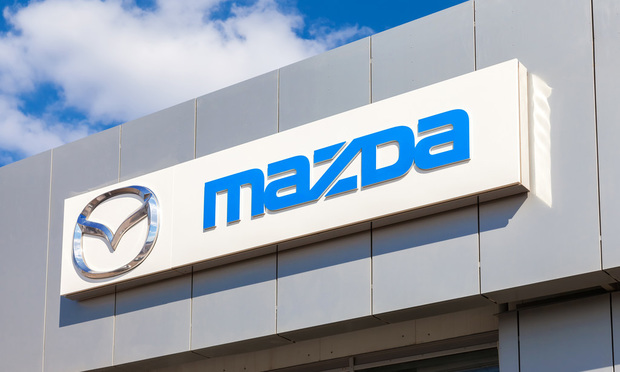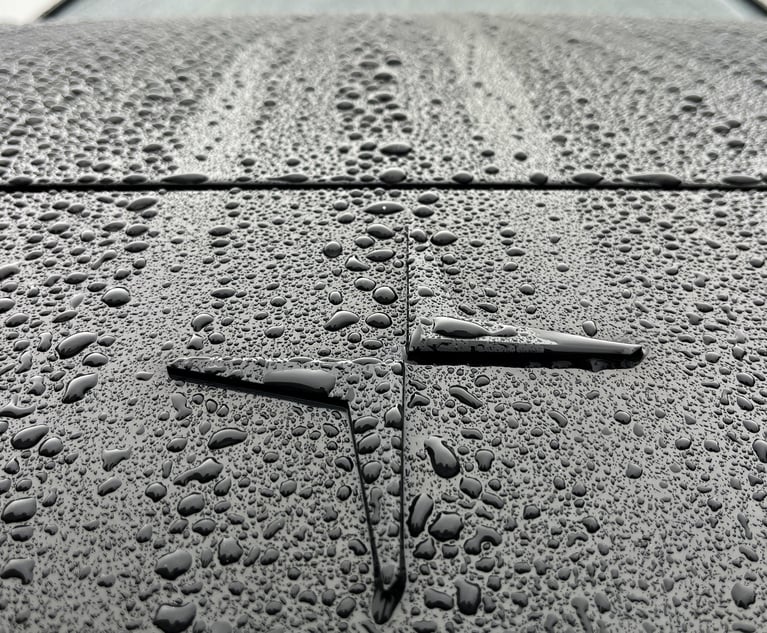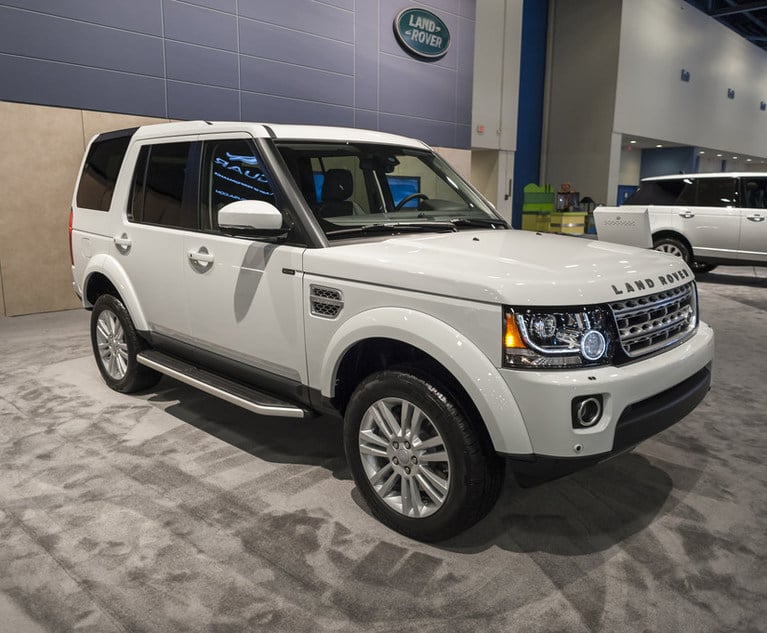Judge Tosses Suit Over Incentives Granted to Mazda Dealerships
A federal judge found the New Jersey Coalition of Automotive Retailers lacks associational standing to sue on behalf of its members.
July 31, 2019 at 04:41 PM
4 minute read
 Official dealership sign of Mazda. Mazda Motor Corp. is a Japanese automaker.
Official dealership sign of Mazda. Mazda Motor Corp. is a Japanese automaker.
A federal judge in Trenton has thrown out a lawsuit protesting an incentive plan giving some Mazda dealerships a discount on the cost of new cars.
The New Jersey Coalition of Automotive Retailers, which brought the suit on behalf of 16 Mazda dealerships statewide, claims the discounts violate state franchise law and are contrary to the public interest. But the coalition lacks associational standing to sue on behalf of its members because 11 of the state’s 16 Mazda dealers take full or partial advantage of the discounts, U.S. District Judge Brian Martinotti ruled.
The case presents a conflict between those dealers who receive the discounts and those who don’t, and a conflict between Mazda dealers and those for other brands, according to Martinotti. Because a majority of the Mazda dealers have an interest contrary to that taken by the coalition in the suit, the interests it seeks to protect are not germane to the organization’s purpose, Martinotti said. Therefore, the coalition fails a test for associational standing that was set by the U.S. Supreme Court in a 1977 case, Hunt v. Washington State Apple Advertising Commission, Martinotti said in granting Mazda’s motion to dismiss.
Under the incentive plan, a Mazda dealer gets up to 6.5% off the cost of vehicles, based on various factors. A facility that sells only Mazdas, has a general manager who is exclusive to Mazda, and meets various design factors gets 4.5% off. Dealers that don’t have a Mazda-only general manager but meet the other facility factors get a 2.8% incentive, though dealers that sell Mazdas and another brand forfeit the entire incentive. Dealers who comply with Mazda’s “customer experience” criteria get a 2% incentive off the price of all cars they sell.
Statewide, three Mazda dealers receive maximum incentives under the program, and eight others receive partial incentives. Five Mazda dealers in the state do not qualify for any incentives.
The suit claims that charging varying amounts to dealers for inventory and its less-favorable terms for dealers selling two or more brands of vehicles violate the state franchise law. And the incentive plan also violates the franchise law by requiring exclusive, “image-complaint” facilities without proving that costs of such improvements can be “financially justified,” the coalition said.
One Mazda dealership owner, Michael Ciasulli, submitted a certification to the court asserting that required retrofits of his dealership would cost $10 million to $12 million, which would place a hardship on his business and prevent him from achieving a reasonable return on his investment.
The coalition argued that the allegation that some of its members benefit under the incentive program should not bar the suit by the coalition because Mazda “should not be able to take advantage of a conflict of its own creation through the implementation of a program that violates [the New Jersey Franchise Practices Act] on its face.” But Martinotti called that argument “unpersuasive.” The coalition “provides no case law suggesting that there are ‘types’ of conflicts that may act to vitiate standing pursuant to the germaneness prong of the Hunt test whereas other conflicts do not.”
The incentive program went into effect in July 2018 and the suit was filed the following September.
Marvin Brauth of Wilentz, Goldman & Spitzer in Woodbridge, representing the New Jersey Coalition of Automotive Retailers, did not return a call about the case.
Brian Sullivan of Fox Rothschild in Roseland, representing Mazda, did not return a call.
This content has been archived. It is available through our partners, LexisNexis® and Bloomberg Law.
To view this content, please continue to their sites.
Not a Lexis Subscriber?
Subscribe Now
Not a Bloomberg Law Subscriber?
Subscribe Now
NOT FOR REPRINT
© 2025 ALM Global, LLC, All Rights Reserved. Request academic re-use from www.copyright.com. All other uses, submit a request to [email protected]. For more information visit Asset & Logo Licensing.
You Might Like
View All

Volkswagen Hit With Consumer Class Action Alleging Defective SUV Engines
3 minute read
Lack of Available Auto Safety Features Does Not Equal Products Liability Act Violation, NJ Appeals Court Says
4 minute read
Class-Action Suit Filed Against Jaguar for Claims of Defective Windshields in Land Rover Defender
Trending Stories
- 1Rejuvenation of a Sharp Employer Non-Compete Tool: Delaware Supreme Court Reinvigorates the Employee Choice Doctrine
- 2Mastering Litigation in New York’s Commercial Division Part V, Leave It to the Experts: Expert Discovery in the New York Commercial Division
- 3GOP-Led SEC Tightens Control Over Enforcement Investigations, Lawyers Say
- 4Transgender Care Fight Targets More Adults as Georgia, Other States Weigh Laws
- 5Roundup Special Master's Report Recommends Lead Counsel Get $0 in Common Benefit Fees
Who Got The Work
J. Brugh Lower of Gibbons has entered an appearance for industrial equipment supplier Devco Corporation in a pending trademark infringement lawsuit. The suit, accusing the defendant of selling knock-off Graco products, was filed Dec. 18 in New Jersey District Court by Rivkin Radler on behalf of Graco Inc. and Graco Minnesota. The case, assigned to U.S. District Judge Zahid N. Quraishi, is 3:24-cv-11294, Graco Inc. et al v. Devco Corporation.
Who Got The Work
Rebecca Maller-Stein and Kent A. Yalowitz of Arnold & Porter Kaye Scholer have entered their appearances for Hanaco Venture Capital and its executives, Lior Prosor and David Frankel, in a pending securities lawsuit. The action, filed on Dec. 24 in New York Southern District Court by Zell, Aron & Co. on behalf of Goldeneye Advisors, accuses the defendants of negligently and fraudulently managing the plaintiff's $1 million investment. The case, assigned to U.S. District Judge Vernon S. Broderick, is 1:24-cv-09918, Goldeneye Advisors, LLC v. Hanaco Venture Capital, Ltd. et al.
Who Got The Work
Attorneys from A&O Shearman has stepped in as defense counsel for Toronto-Dominion Bank and other defendants in a pending securities class action. The suit, filed Dec. 11 in New York Southern District Court by Bleichmar Fonti & Auld, accuses the defendants of concealing the bank's 'pervasive' deficiencies in regards to its compliance with the Bank Secrecy Act and the quality of its anti-money laundering controls. The case, assigned to U.S. District Judge Arun Subramanian, is 1:24-cv-09445, Gonzalez v. The Toronto-Dominion Bank et al.
Who Got The Work
Crown Castle International, a Pennsylvania company providing shared communications infrastructure, has turned to Luke D. Wolf of Gordon Rees Scully Mansukhani to fend off a pending breach-of-contract lawsuit. The court action, filed Nov. 25 in Michigan Eastern District Court by Hooper Hathaway PC on behalf of The Town Residences LLC, accuses Crown Castle of failing to transfer approximately $30,000 in utility payments from T-Mobile in breach of a roof-top lease and assignment agreement. The case, assigned to U.S. District Judge Susan K. Declercq, is 2:24-cv-13131, The Town Residences LLC v. T-Mobile US, Inc. et al.
Who Got The Work
Wilfred P. Coronato and Daniel M. Schwartz of McCarter & English have stepped in as defense counsel to Electrolux Home Products Inc. in a pending product liability lawsuit. The court action, filed Nov. 26 in New York Eastern District Court by Poulos Lopiccolo PC and Nagel Rice LLP on behalf of David Stern, alleges that the defendant's refrigerators’ drawers and shelving repeatedly break and fall apart within months after purchase. The case, assigned to U.S. District Judge Joan M. Azrack, is 2:24-cv-08204, Stern v. Electrolux Home Products, Inc.
Featured Firms
Law Offices of Gary Martin Hays & Associates, P.C.
(470) 294-1674
Law Offices of Mark E. Salomone
(857) 444-6468
Smith & Hassler
(713) 739-1250






